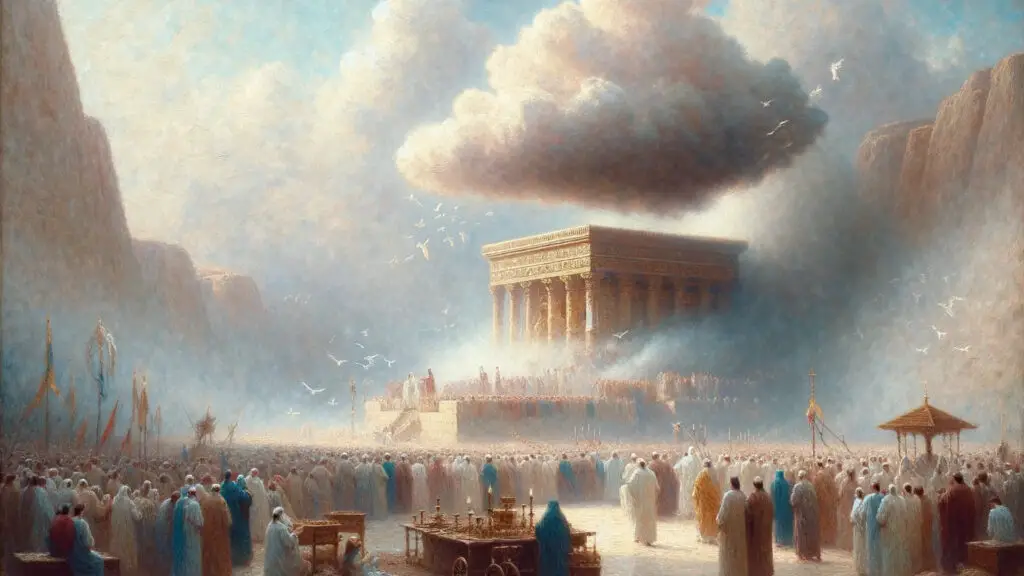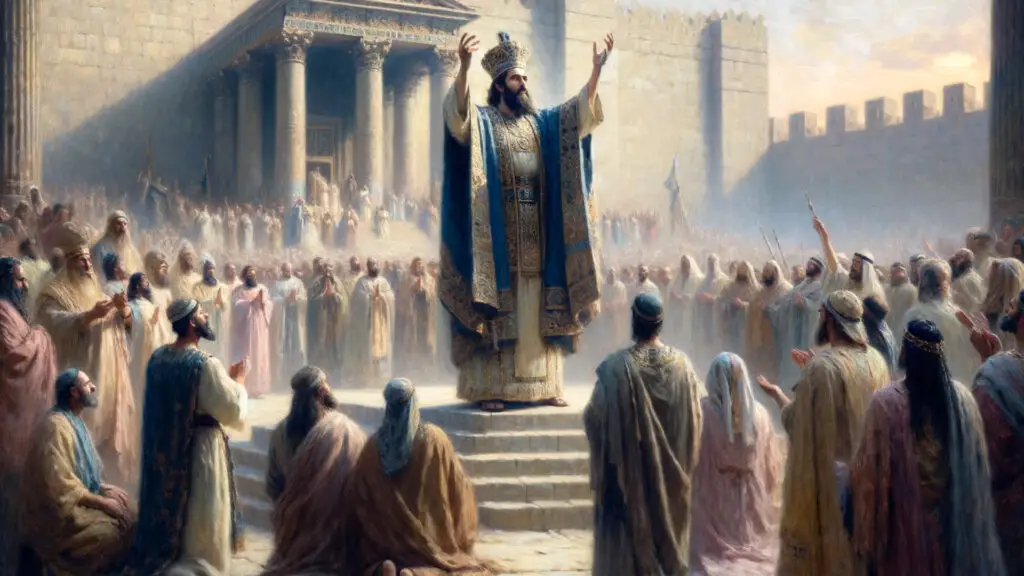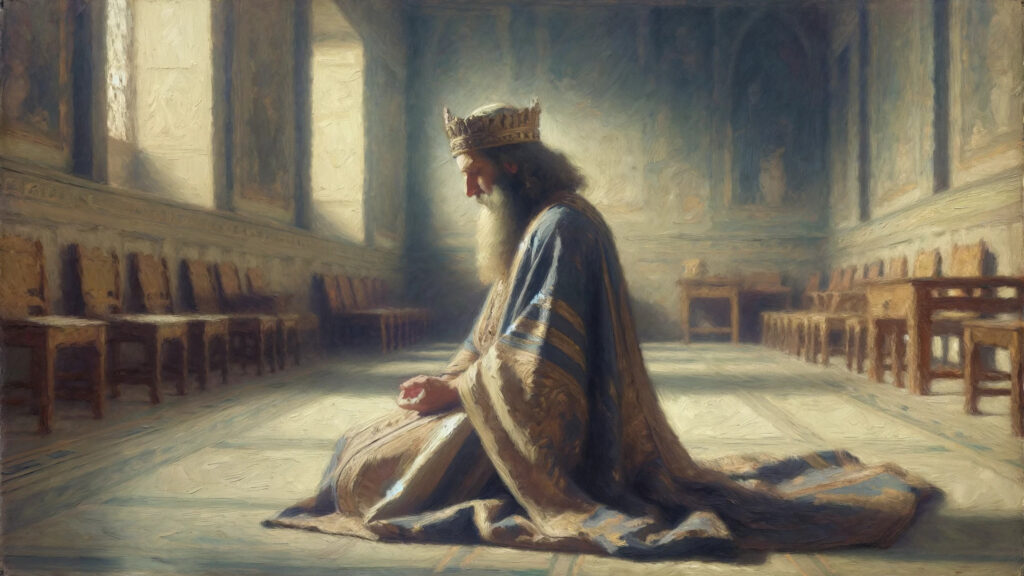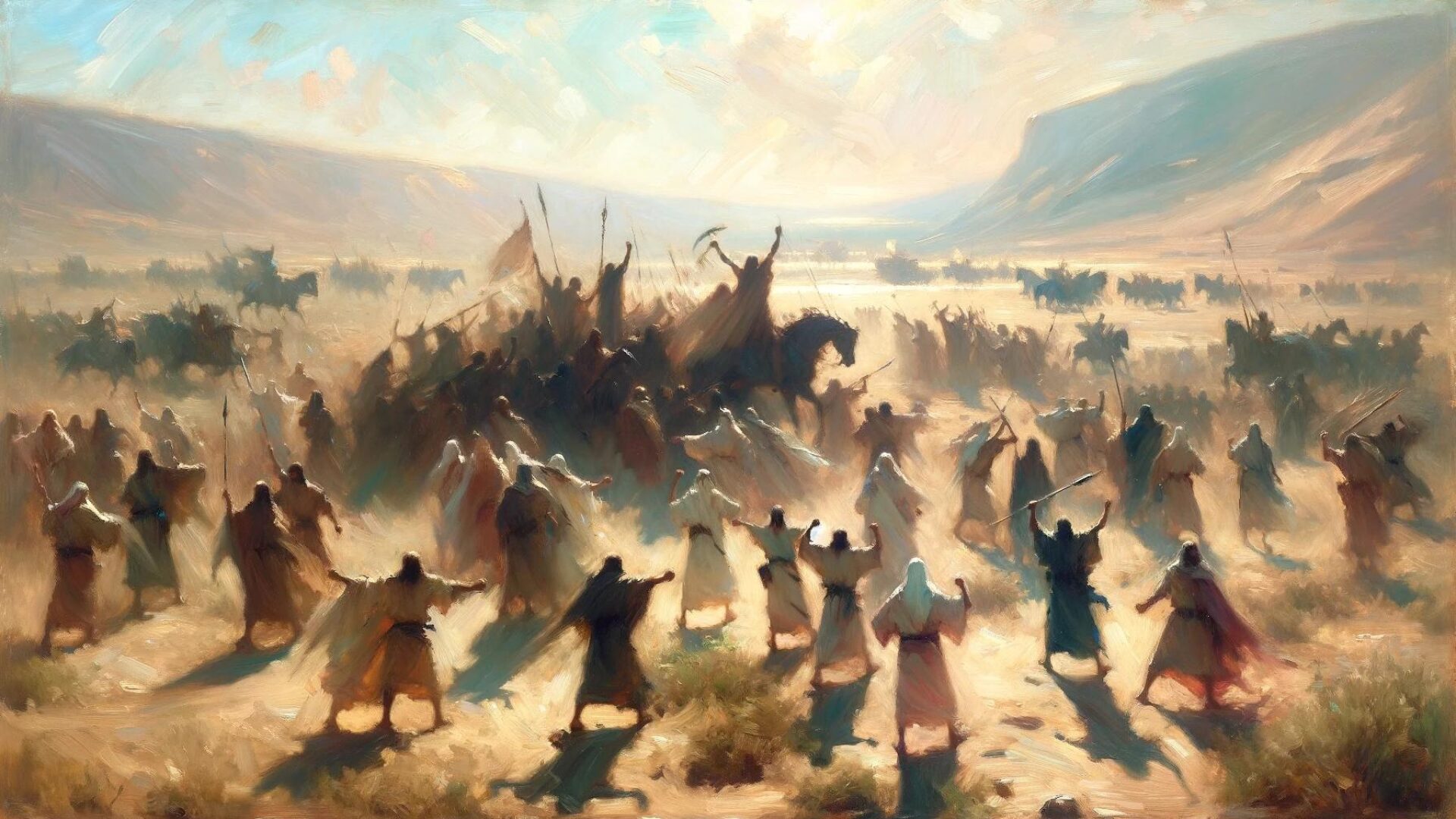Solomon’s temple, a magnificent structure of stone and timber, transforms into a sacred space imbued with God’s intangible glory in 1 Kings Chapter 8.
This chapter presents a vivid narrative of the temple’s consecration by Solomon, a fusion of profound faith and astute political leadership. It narrates the grand dedication ceremony, the remarkable divine response to this dedication, and Solomon’s heartfelt prayer, providing a window into the spiritual heart of ancient Israel.
The chapter richly illustrates the interplay between the earthly and the divine, showcasing the temple not merely as a physical edifice but as a pivotal junction of Israel’s religious and communal life.
Key Takeaways
- Strategic Display of Power and Divine Fulfillment: The relocation of the Ark of the Covenant not only showcased Solomon’s wealth and power but also symbolized the fulfillment of God’s promises to the Davidic lineage, reinforcing Solomon’s legitimacy.
- Divine Validation and National Unity: The divine presence, symbolized by the cloud filling the temple, not only affirmed Solomon’s wisdom and leadership but also played a crucial role in fostering national unity through shared religious practices.
- Wisdom in Construction and Diplomacy: Solomon’s address revealed his adept handling of the temple’s construction, balancing political and social challenges with diplomatic skill, and executing a visionary project that transcended his reign.
- The Temple as a Spiritual Beacon: Solomon’s prayer underscored the temple’s centrality in Israel’s faith, seeking God’s ongoing presence and intercession for justice and forgiveness, thereby upholding the nation’s spiritual and moral integrity.
1 Kings 8:1-9, The Ark of the Covenant is Brought to the Temple
In 1 Kings 8:1-9, King Solomon gathers Israel’s leaders in Jerusalem for a major event: moving the Ark of the Covenant into the newly built temple.
This is more than a ceremony; it’s a big moment showing that God is with Israel.
The Ark’s move into the temple, a special place for worship, fulfills God’s promises and highlights Solomon’s role in continuing his father David’s legacy.
The temple symbolizes the unity of the people and their relationship with God. It’s a physical sign of Solomon’s commitment to leading the nation and honoring God.
1 Kings 8:10-13, The Glory of God Fills the Temple
In these verses of 1 Kings, a breathtaking moment unfolds: As the priests exit the Holy of Holies, a cloud fills the Lord’s temple, marking a divine presence. This cloud represents God’s glory, showing His approval and presence in this sacred space. It’s a powerful sign during the temple’s dedication, affirming that this isn’t just any building – it’s a special place chosen by God.

This event is crucial because it shows everyone, including Solomon, that God is really with them. It’s like a divine thumbs-up for all the hard work that went into building the temple.
For Solomon, it’s also a big moment proving his wisdom and leadership, as he’s the one who led this whole temple project.
What’s happening here is more than just a historical event; it’s a mix of religious importance and a strong message about Solomon’s role as king. He’s not just a ruler; he’s a leader chosen by God, and this cloud is a sign that God trusts him to lead His people.
1 Kings 8:14-21, Solomon’s Speech at the Dedication of the Temple
Here, Solomon addresses the assembly of Israel, turning their attention to the significance of the temple they now stand before. He recalls his father David’s dream of building a house for the Lord, a dream that David couldn’t fulfill but Solomon has now brought to reality.
Solomon’s speech is more than a history lesson; it’s a moment that highlights his wisdom and understanding of his role in God’s plan. He talks about how he’s not just continuing his father’s work but also fulfilling a divine promise, showing that this temple is part of a much bigger picture.
This part of the story is about connecting the past with the present.
Solomon acknowledges the hard work and challenges that went into building the temple, including the need for forced labor, which was a common but difficult aspect of large projects back then.

The passage really shows Solomon as a key figure who’s able to navigate the complexities of his time. He’s not just a king building a temple; he’s someone who understands the balance between divine destiny and the practicalities of ruling a nation. Through his words, Solomon reinforces his legitimacy as a leader and his commitment to honoring God, setting a foundation for the temple’s role in Israel’s spiritual life for generations to come.
1 Kings 8:22-53, Solomon’s Prayer of Dedication
This part of 1 Kings 8 shows King Solomon in a deeply spiritual moment, as he prays at the dedication of the temple, not just as a king but also a spiritual leader for Israel.
Solomon’s prayer is powerful and covers a lot of ground. He starts by acknowledging God’s greatness and asking for His favor. He’s hoping that God will always be present in this temple they’ve just built.
But Solomon doesn’t stop there. He reminds God about the promises made to his father David, about having a lasting dynasty. He knows that keeping these promises depends not just on God but also on the people staying true to their faith.
Solomon then shifts to talk about the temple itself. He sees it as the heart of Israel’s faith – a place where God’s people can come and pray and be heard. He asks God to listen to their prayers and to bring justice and forgiveness.
Throughout his prayer, Solomon keeps coming back to this idea that the temple isn’t just a building. It’s a symbol of how the people of Israel are connected to God and to each other. He’s asking for God’s help to keep the nation strong, both spiritually and as a community.
In these verses, Solomon captures what it means to be a leader who cares about both his people’s faith and their everyday lives. He understands the temple as a place where the nation comes together, and he’s doing his best to make sure it serves that purpose.

1 Kings 8:54-61, Solomon Blesses the People of Israel
In verses 54-61, Solomon concludes his prayer with a significant gesture, rising from kneeling before the altar, his hands stretched towards heaven. This act is more than personal devotion; it symbolizes the entire nation’s renewal of their covenant with God. Solomon’s posture reflects both humility and a recognition of the divine presence now residing in this sacred space.
The passage emphasizes God’s steadfast love and the need for Israel to remain faithful to His statutes and commandments.
Through his prayer, Solomon reaffirms Israel’s commitment to God, highlighting the mutual responsibilities in their covenant relationship. The king acknowledges the Lord as the sovereign guide of Israel’s destiny, underlining the importance of divine guidance in their national life.
This moment marks a crucial point where personal faith and national identity intersect, reflecting the deep connection between the king, his people, and their God.
1 Kings 8:62-66, The Feast of Dedication for the Temple
The final verses of 1 Kings 8 describe how Solomon, following his prayer, offers a vast number of sacrifices, dedicating the temple to the Lord. This is not just a ritual; it’s a grand and meaningful act that marks the end of the temple’s inauguration. Solomon’s sacrifices are detailed and significant, symbolizing the temple’s consecration and reflecting his dedication to the divine covenant.
The festivities that follow are extensive, lasting several days, emphasizing the importance of this time for communal worship and celebration. It’s a big event for everyone, as Israelites from all over the country come together.
This gathering is more than just a party; it’s a national event where everyone participates in renewing their covenant with God.
The peace offerings made during this time are a sign of the divine presence and favor.
These verses paint a picture of a nation united in worship and joy, celebrating the completion of the temple and the promise of God’s continued blessings.
It’s a time of great significance for Israel, both religiously and as a community, as they come together to honor God and the covenant that binds them.





